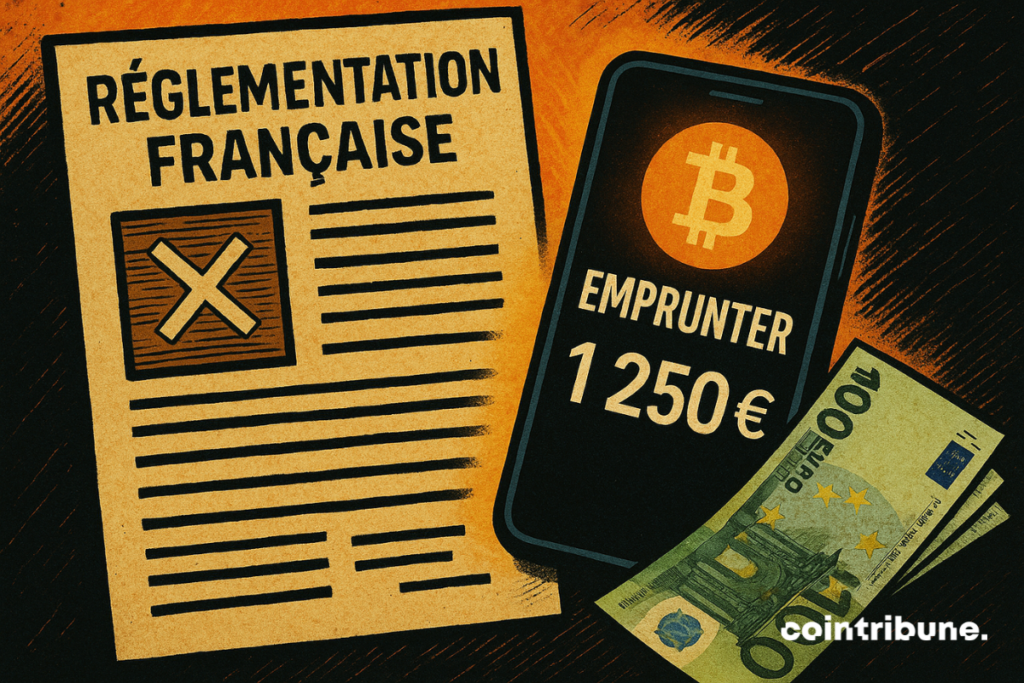Unlock Liquidity Without Dumping Your Bag: How France’s Crypto Lending Breakthrough Rewrites the Rules
Paris just handed crypto hodlers the ultimate cheat code.
France's new regulatory framework slashes the red tape around crypto-backed loans—letting investors tap fiat without triggering taxable events or surrendering their moon tickets. The law effectively turns your cold wallet into a collateral vault overnight.
Bankers hate this one trick.
While traditional lenders still demand credit scores and 90-day waiting periods, DeFi protocols on French soil can now issue instant loans against BTC/ETH stacks at sub-5% APY. The kicker? Zero capital gains headaches since you're not technically selling.
Regulators claim this 'balanced approach' protects consumers. Meanwhile, degenerate farmers are already leveraging their JPEGs to buy more JPEGs—because nothing says financial innovation like recursive ape-backed debt.

In brief
- Cryptos can now serve as collateral for a loan in France.
- Only a few authorized banks offer this crypto Lombard credit.
- A legal framework exists, but access remains limited and highly regulated.
Since, a discreet but fundamental regulatory change authorizes in France the use ofaswithin the framework of a. Previously reserved for securities, this financing mechanism now allows individuals or businesses to take out a, provided they are deposited with an authorizedbank.
In practice, this allows an investor to mobilize theirto finance, for example, a real estate purchase or a professional project, while remaining the owner of their assets.
A symbolic advance, but still under constraints
This change of course is part of a still cautious European framework: current regulations require banks to fully cover the risk associated withby immobilizing an equivalent amount in. A measure that currently limits the scope of these loans.
For, France director of the crypto exchange, “this is not yet a usage revolution, but it is a clear turning point symbolically. The fact that a legal framework now exists to use one’s cryptos as leverage in traditional finance is a major advance. It sends a strong message: digital assets are no longer seen only as speculative, but also as carriers of patrimonial value.”
The advantages for borrowers are therefore real, but access conditions remain strict and amounts limited.
A still very regulated implementation
Although the law now offers a legal framework, the practical implementation ofremains fraught with obstacles. Only a few authorizedbanks are able to offer this type of product, and they proceed with caution.
The reason: the prudential treatment of crypto-assets. Classified as high-risk assets, they require banks to mobilize an equivalent amount of, which strongly limits their operational profitability.
, Digital Asset Product Offer Director at, explains:
Not all crypto-assets are equal when it comes to backing a Lombard loan. At Delubac & Cie, we retain only very liquid and well-capitalized assets, such asor. Compliance is central: we require full traceability of the origin of funds. Eligibility also depends on the borrower’s profile and the quality of the portfolio, which are subject to safety margins viaratios adjusted to volatility.
Besides regulatory constraints, there is also the question of. These must be deposited on controlled platforms or in partnership with the bank, which requires secure and suitable custody solutions.
He adds: “Monitoring a crypto Lombard credit requires a technical infrastructure capable of valuing assets in real-time and triggeringinstantly in case of rapid decline. This 24/7 monitoring is complex and requires robust systems. Moreover, the regulatory framework requires a French bank to immobilize one euro of own funds for every euro lent; this mechanically limits deployment capacity. However, custody is not a barrier: we specialize in the.”
What short-term adoption?
Whileremains for the moment reserved for a niche clientele, the existence of a legal framework opens the way to new uses. This is especially the case inor project financing without divestment. Ultimately, this type of arrangement could become a tool forfor crypto-asset holders, particularly if European regulations evolve to relax the treatment of.
On the banking institutions’ side, the most agile or specialized could take advantage of this new possibility to attract a clientele on the frontier between traditional finance and. An increasingly present investor profile on the French market.
Maximize your Cointribune experience with our "Read to Earn" program! For every article you read, earn points and access exclusive rewards. Sign up now and start earning benefits.

